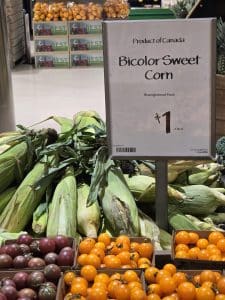Page Title
Action Tips & Talking Points for Visiting Whole Foods
Tell Whole Foods Market to stop selling GM sweet corn
Hello, Thank you for taking action to demand that Whole Foods Market remove genetically modified (GM or genetically engineered)/ “bioengineered” fresh sweet corn from their produce section. It might feel a bit daunting to talk to Whole Foods staff about this, but in my experience, they were polite and didn’t know much about the word “bioengineered” that appears on the GM sweet corn signage. You will probably be more knowledgeable on the topic than them. We’ve put together some info and talking points to make it easier to take action.
Your voice as a customer is the most powerful voice to influence store policy, so thank you for taking this important action!
Please report any information back to me or just let me know how your conversations went. You can send me an email, or if you would prefer to speak over the phone, we can set up a time to chat. For either option, I can be reached at outreach@cban.ca. Thank you! Fionna, CBAN Campaigner
1. Steps & tips to visit your Whole Foods store
 Before you go to the store, you could print one or two copies of CBAN’s letter to Whole Foods to hand to the staff you talk to, so they have some info after you leave. Please ask them to send the letter to head office. If you feel comfortable, you can write your name and contact info on the letter so they know it’s coming from a concerned customer, and they can respond
Before you go to the store, you could print one or two copies of CBAN’s letter to Whole Foods to hand to the staff you talk to, so they have some info after you leave. Please ask them to send the letter to head office. If you feel comfortable, you can write your name and contact info on the letter so they know it’s coming from a concerned customer, and they can respond
When you get to the store, first check to see if GM “bioengineered” sweet corn is for sale in the produce section (it will have “bioengineered” in small print on the sign, (see photos at www.cban.ca/WholeFoodsAlert). If so, you have a great starting point for a conversation at the store. If not, no problem – you can still ask the store to only stock non-GM sweet corn on the cob. Please let us know either way. From CBAN’S Alert, you are aware that GM sweet corn has been confirmed in half of the Whole Foods locations in Canada.
Ask to speak to the Store Manager or Produce Manager. Here are some talking points as a guide:
2. Questions to ask the staff/ what to demand
- Most sweet corn grown in Canada is non-GM (either conventional or organic), therefore, Whole Foods has plenty of opportunity to supply non-GM, conventional sweet corn. There is also the option of sourcing organic sweet corn which is non-GM and grown without synthetic pesticide
- You are selling GM corn. As a Whole Foods customer, I am asking you to stop. Please switch your supply to only non-GM corn.
- You should not sell any GM vegetables or fruit in your produce section. (Info in CBAN’s Guide to a Non-GMO Produce Section or print a copy to hand to them.)
You could also help to investigate further: In our initial investigations, we saw that the GM sweet corn was labeled as “Product of Canada,” “Product of Ontario,” and “Product of BC” depending on the location. It was also often labelled “Local.” Depending on the label at your store, you can also ask:
- If it says “Product of Canada”: “Can you tell me what province this corn is from? “
- If it says “Local”: “I can see that this is a local product, where is the farm located? What farm is supplying the corn?”
Talking Points
GM sweet corn
- The “bioengineered” sweet corn you are selling is genetically modified, i.e. it is a Genetically Modified Organism (GMO).
- All GM sweet corn on the market, produced by either Bayer (Monsanto) or Syngenta, is genetically modified to be insect-resistant with up to three different Bt toxins and/or to tolerate herbicides such as glyphosate (RoundUp) and glufosinate (Liberty)
Health risks from the consumption of fresh GM sweet corn
- Insect-resistant corn plants are genetically modified to express a toxin from the soil bacteria Bacillus thuringiensis (Bt) which is known to harm the guts of specific insects. However, research indicates that Bt in GM crops is not equivalent to natural Bt, can harm non-target insects, is shown in animal feeding tests to harm mammals, and has allergenicity potential. See CBAN’s factsheet for more info.
- Exposure to the pesticides used in growing GM sweet corn is linked to human health risks. Research links the herbicide glyphosate to health problems including cancer, neurological diseases, endocrine disruption and birth defects. The International Agency for Cancer Research (IARC) of the World Health Organization classifies glyphosate as a “probable human carcinogen.” See CBAN’s factsheet for more info.
Misalignment with Whole Foods’ values, commitments, and policy
Organic farming prohibits the use of genetically modified organisms (GMOs):
- Whole Foods’ first Core Value is “We Sell the Highest Quality Natural and Organic Foods.” GM sweet corn is not organic, and it is not natural.
- Selling GM sweet corn contradicts Whole Foods’ commitment to supporting organic farming.
- Selling GM sweet corn contradicts Whole Foods’ pollinator health policy which tries to protect pollinators by requiring their suppliers to use preventative and biological controls to reduce pesticides.
3. Report back to CBAN
Let us know how your conversation went. Here is some information that is useful to us:
- Did the staff know what you were talking about when you were discussing the “bioengineered”/GM corn? Did they know it was a GMO?
- Were the staff aware of the controversy around GM sweet corn?
- Were the staff able and willing to tell you where the GM corn was from (i.e. what province/ region (if not indicated on the sign))?
- Were the staff concerned that the GM sweet corn contradicted Whole Foods’ core values, commitments and policy?
Contact Fionna at outreach@cban.ca
For more information check www.cban.ca/corn





